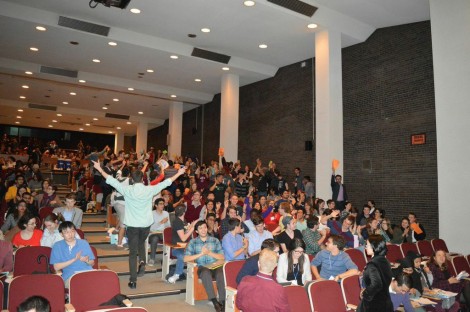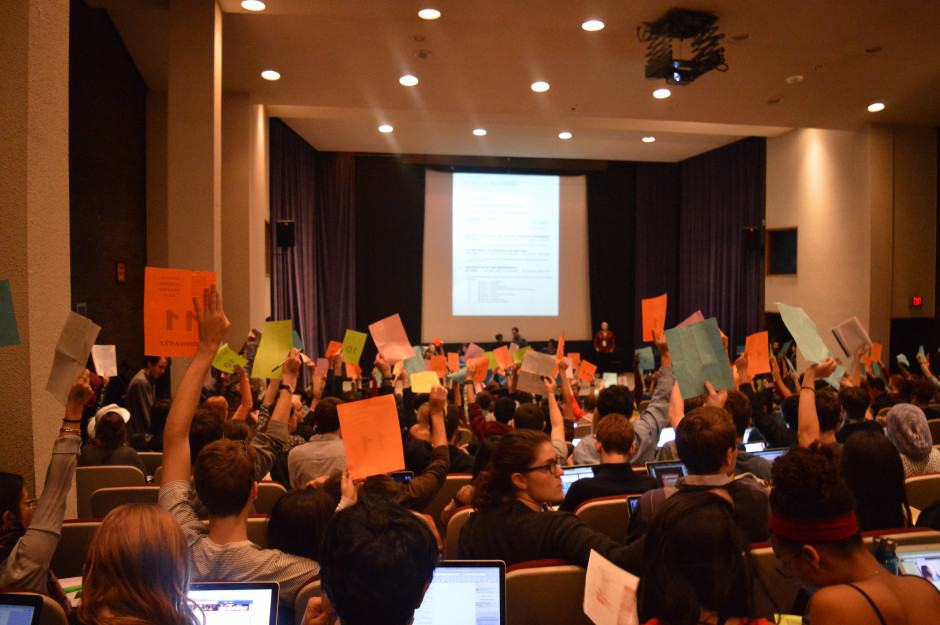After a heated debate, the proposed changes to the University of Toronto Students’ Union (UTSU) Board of Directors structure were narrowly defeated at the Annual General Meeting (AGM).
Several other bylaw amendments were passed by omnibus.
Bylaw V, which contains the controversial proposed changes to the Board of Directors structure, and bylaw XI, which governs commissions and committees, were externalized and put to a vote later in the evening.
If passed, the amendments would have granted representation to colleges and professional faculties through a committee, and replaced the current board structure with constituency directors with purview over specific equity-based issues.
Mixed reactions

Students celebrating the defeat of the controversial board proposal motions. SARAH NIEDOBA/THE VARSITY
Following the failure of the motion, several students present at the meeting erupted into loud cheers, while others appeared disappointed.
“I’m feeling relieved, but also saddened, in the sense that knowing this is going to carry on for another year,” said Teresa Nguyen, president of the Engineering Society.
“It’s been such a long battle,” Nguyen added.
Motion defeated. #UTSUAGM14
— The Varsity (@TheVarsity) October 30, 2014
Victor Baciu, president of the St. Michael’s College Student Union (SMCSU), left the AGM with mixed emotions.
Baciu said he was glad that Bollo-Kamara brought up the one-year time frame.
“I hope that in the future, [Bollo-Kamara] will consult with us even further and make sure that when the next year comes, we have a board structure that we all feel works the best for all our constituencies and everyone is represented, with college representation that colleges think is fair,” Baciu added.
Bob Parry, New College Student Council (NCSC) president, said that New College has no official stance on the changes.
“It gives us more time to think of alternatives, gives students a full year to consider other options,” Parry said
Bollo-Kamara hinted at more consultations and discussion to come with the formulation of a new Board of Directors structure. “I am glad that we’ve been able to start this conversation about how best the UTSU can represent its members and I’m looking forward to continuing that over the next 12 months,” she added.
Bollo-Kamara was disheartened that much of the evening’s conversation revolved around the board structure proposal and that the meeting adjourned early.
Bollo-Kamara: "One single person cannot be a representative of an entire community."
— The Varsity (@TheVarsity) October 30, 2014
“We didn’t get to talk about any of the other motions that students put forward,” Bollo Kamara said.
Najiba Ali Sardar, UTSU vice-president, equity, did not vote in favour of the proposal. “I do feel like this proposal was flawed in many ways,” she said, adding, “If there is a proposal that is seeing this much backlash from our students, are we really representing our students on-campus?”
Procedural disputes
Earlier in the meeting, Ben Coleman, student governor, motioned to strike a section of UTSU bylaw XVI dealing with omissions and errors.
“In the event that there are any omissions in giving notice to any member, director or officer or non-receipt of any notice when given in accordance with the Bylaws, such errors or omissions will not invalidate any action taken to any meeting to which the notice pertained,” the section that Coleman motioned to strike reads.
“I just want to make sure there’s consequences when there’s an omission of notice,” Coleman said on his motion.
“If the error was made in proper diligence to give notice, then that’s an error that should have consequence,” Coleman added.
Cameron Wathey, UTSU vice-president, internal and services, invited UTSU legal counsel to give an opinion on the matter.
The legal counsel, who was not named, said that in the case that a member brought a non-profit corporation to court due to an omission in giving notice of a meeting, the court would usually decide in favour of the non-profit corporation when best efforts are made to notify all members.
Pierre Harfouche, UTSU vice-president, university affairs, asked the chair how many votes were required to pass each bylaw. Ashkon Hashemi, UTSU chair, said that the voting proportions depend on the nature of the bylaw.
Under the Canada Not-For-Profit Corporations Act (CNCA), Hashemi said, all bylaws except the one pertaining to representation on the Board of Directors, require a simple majority.
Hashemi said the UTSU is operating under the Canada Not-for-profit Corporations Act as of October 16.
Gabriel Zoltan-Johan, chairperson of the Victoria University Students’ Administrative Council (VUSAC), said that, if the meeting is being governed under the CNCA, the CNCA requires an agenda. Zoltan-Johan alleged that a transition report from Corporations Canada supported his argument.
Motions for the AGM were presented under an “Order of Business.”
Hashemi responded that the CNCA does not reference an agenda.
Meeting adjourned
The meeting adjourned before the final item on the order of business, a Consideration of Motions Duly Served, was addressed.
The Consideration of Motions Duly Served contained several items dedicated to UTSU activism and advocacy work.
1400 in favour. The meeting is adjourned at 11:00 PM. #UTSUAGM14
— The Varsity (@TheVarsity) October 30, 2014
Following the end of the voting on the proposed board structure, Vip Vigneswaran motioned to adjourn the meeting before the final items could be addressed.
“I felt that tensions were high, people were tired, and all the contentious issues that required membership approval had been dealt with,” said Vigneswaran.
However, Victoria College director Zach Morgenstern, who moved many of the initiatives in the final motion, was dismayed at the lack of recognition paid to the projects. The Consideration of Motions Duly Served included a motion mobilizing an anti-war coalition and a motion regarding the Student Commons Management Committee.
“As someone who thinks that the union needs to radically improve its involvement levels, I’m disappointed that I didn’t get the AGM audience,” Morgenstern said, adding: “I don’t want to be forever stuck in the trap of getting elected to make rules about elections.”
Since the board structure proposal failed, the UTSU now has one year to put forward and submit a new structure for the Board of Directors.
Full story in print on Monday.
UPDATE: An expanded version of this article can be found here


